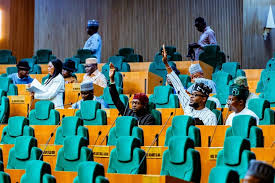The House of Representatives has approved the sum of ₦1.81 trillion as the 2025 budget for the Federal Capital Territory (FCT), following the bill’s successful passage at the third reading on Wednesday. The session was presided over by the Deputy Speaker of the House, Benjamin Okezie Kalu.
President Bola Ahmed Tinubu had earlier sent the FCT budget proposal to the National Assembly on May 14, 2025, urging lawmakers to consider and pass the estimates without delay. The swift passage of the budget indicates the legislative arm’s commitment to supporting infrastructural and administrative development in the nation’s capital.
During the budget defence session, the Minister of the Federal Capital Territory, Nyesom Wike, disclosed that a significant portion of the budget—over 70 per cent—was dedicated to capital expenditure. According to him, out of the total ₦1.81 trillion, about ₦1.28 trillion has been earmarked for capital projects, while ₦494.1 billion is set aside for recurrent spending, which covers salaries, overheads, and other running costs of the FCT Administration.
Nyesom Wike emphasised that the allocation to capital expenditure is in line with the administration’s focus on visible and impactful infrastructural development. He stated that the Federal Capital Development Authority (FCDA) and the Satellite Towns Development Department (STDD) would be responsible for implementing key infrastructure projects across the city centre and satellite towns.
Among the projects listed for execution in the 2025 fiscal year are the dualisation and upgrading of the Ushafa to War College/Army Checkpoint road and adjoining roads, the construction of the Pai to Gomani road in Kwali Area Council, and the dualisation of the Kuje to Gwagwalada road. These projects are aimed at improving connectivity and reducing traffic congestion, especially in rapidly expanding satellite towns.
The minister further noted that the budget reflects the administration’s intention to address long-standing infrastructure gaps in the FCT. He stated that the capital city is expected to see a visible transformation through the continuation and completion of key road projects, which are critical to boosting economic activity and easing movement across the territory.
The 2025 FCT budget is one of the largest allocations to the territory in recent years and aligns with President Tinubu’s broader plan to modernise Abuja and improve infrastructure across the capital. The administration has continued to emphasise the importance of infrastructure to national development, especially as Abuja serves as both the political and administrative centre of Nigeria.
In previous years, funding challenges and delayed releases have slowed down the pace of development in the FCT, especially in satellite towns where residents often complain of poor roads, inadequate drainage, and limited access to public services. With this budget, authorities hope to close those gaps and stimulate development beyond the city centre.
Legislators also stressed the need for proper monitoring of the projects to ensure value for money. They called on the FCT Administration to ensure that contractors deliver quality jobs and that all projects are completed within their scheduled timelines. Members of the House Committee on FCT also urged increased transparency and accountability in the budget implementation process.
The passage of the budget comes at a time when Nigeria is facing economic challenges and rising demands for improved infrastructure, especially in urban centres. The approval of the ₦1.81 trillion budget sends a strong signal that the government remains focused on improving living standards in the FCT through enhanced service delivery and infrastructure expansion.
So far, the FCT Administration under Nyesom Wike has promised to prioritise the completion of ongoing projects and embark on new ones that would have a direct impact on the lives of residents. The success of the 2025 budget, however, will depend largely on how efficiently it is implemented and the level of oversight provided by both the executive and legislative arms.
